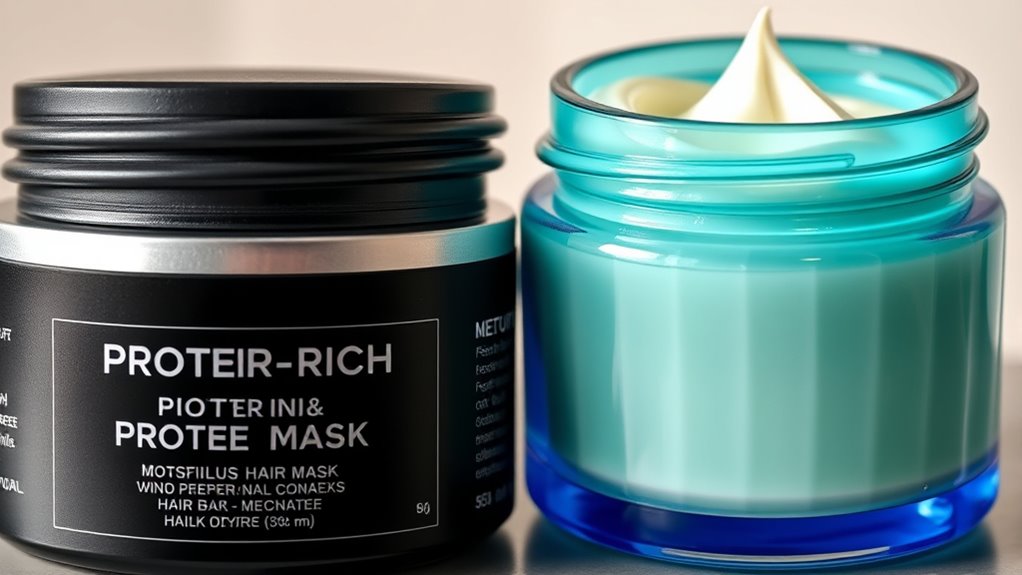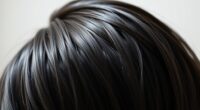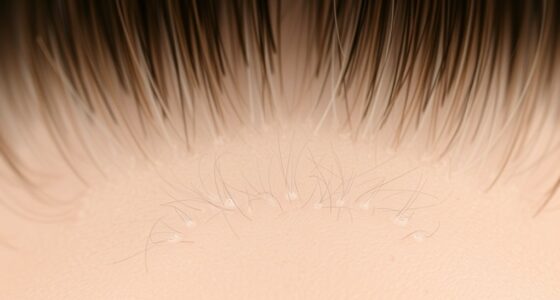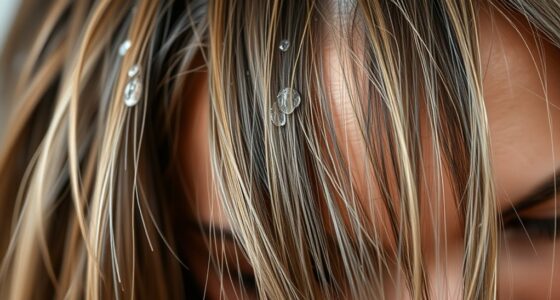Choosing between protein and moisture hair masks depends on your hair’s specific needs. If your hair feels brittle, dull, or shows signs of damage, a protein mask can help rebuild and strengthen it. If your hair is dry, frizzy, or lacks shine, a moisture mask adds hydration and softness. To keep hair healthy overall, it’s best to balance both treatments. Keep exploring to discover which option suits your hair type perfectly.
Key Takeaways
- Protein masks strengthen damaged hair and reduce breakage, ideal for brittle or dull hair needing repair.
- Moisture masks hydrate dry, frizzy hair, improving elasticity and softness for healthier manageability.
- Use protein masks sparingly (every few weeks) to prevent stiffness, while moisture masks can be used weekly for regular hydration.
- Alternating between protein and moisture masks helps balance hair strength and flexibility based on changing needs.
- Choose protein masks for damage repair and moisture masks for hydration; tailor usage to your hair’s condition for optimal results.

Are you unsure which hair mask is right for your hair type and needs? Navigating the world of hair masks can be overwhelming, especially with so many options out there. The key is understanding the difference between protein and moisture treatments, which can help you pick the perfect mask. Whether you prefer DIY recipes or trusted commercial brands, knowing when and why to use each type makes a big difference in your hair health.
Protein masks are designed to strengthen and rebuild damaged hair. If your hair feels brittle, appears dull, or has been exposed to heat styling, chemical treatments, or environmental stressors, a protein mask can help. These masks work by filling in gaps in the hair shaft, restoring strength, and reducing breakage. You might find DIY recipes that include ingredients like eggs, yogurt, or keratin-rich products effective, or you can opt for commercial brands that specifically target damage with added proteins. Just be cautious—overusing protein masks can make your hair feel stiff or sticky, so use them sparingly, about once every few weeks. They’re a great choice if your hair needs a quick repair boost or if you notice signs of damage.
Protein masks strengthen and repair damaged hair, restoring strength and reducing breakage with careful, occasional use.
Moisture masks, on the other hand, focus on hydrating and softening your hair. If your strands feel dry, rough, or frizzy, a moisture-rich mask can restore suppleness and manageability. These treatments are ideal if your hair is naturally dry or exposed to harsh weather conditions. DIY options often include ingredients like honey, aloe vera, or coconut oil, which are known for their hydrating properties. Commercial brands also offer a wide array of moisture masks packed with nourishing oils and humectants that attract water into your hair. Regular use of moisture masks—about once a week—can improve elasticity and shine, making your hair more resilient to damage.
The trick is to balance these treatments based on your hair’s current needs. If your hair feels weak or damaged, lean toward protein masks, but don’t forget to follow up with moisture treatments to keep your hair flexible and healthy. Conversely, if your hair is dry or frizzy, prioritize moisture masks, but consider adding a protein treatment if you notice increased breakage or dullness. A good routine might involve alternating between the two, depending on how your hair responds.
Frequently Asked Questions
Can I Use a Protein Mask Daily Without Damaging My Hair?
Using a protein mask daily isn’t recommended because it can cause protein damage and lead to a moisture imbalance in your hair. Overusing protein treatments can make your hair feel stiff, brittle, or dry, risking breakage. Instead, apply protein masks only when needed, usually once a week or less. Balance your hair’s moisture levels with hydrating masks to keep your hair healthy, strong, and flexible.
How Do I Know if My Hair Needs More Moisture or Protein?
You can tell if your hair needs more moisture or protein by checking your hair’s porosity and scalp condition. If your hair feels dry, brittle, or frizzes easily, it likely needs more moisture. If it feels weak, limp, or shows signs of breakage, it may need protein. Also, assess your scalp; a dry, flaky scalp suggests moisture, while a greasy or irritated scalp hints at a protein imbalance.
Are There Natural Alternatives to Commercial Protein and Moisture Masks?
It’s funny how you might stumble upon natural solutions just when you need them. DIY remedies and herbal infusions can be great alternatives to commercial masks, offering nourishing moisture or protein. You can use coconut oil, honey, or aloe vera for moisture, while eggs or yogurt provide protein. These natural options are easy, affordable, and effective, making your hair care routine more organic and personalized without relying on store-bought products.
Can Mixing Different Masks Improve Hair Health?
Mixing different masks can improve your hair health if you use proper layering techniques and guarantee mask compatibility. You might combine hydrating and nourishing masks to address multiple needs, but be cautious not to overload your hair or cause product conflicts. Always test small sections first, and follow with a conditioner to seal in benefits. This approach helps maximize moisture, strength, and overall hair vitality.
How Long Should I Leave a Hair Mask on for Optimal Results?
You should leave a hair mask on for the recommended application timing, usually between 5 to 30 minutes, depending on the product. For ideal results, follow the instructions on the label and avoid overdoing it, as too long can cause damage. Incorporate mask frequency into your routine—use a deep conditioning mask weekly or biweekly to maintain healthy hair without overloading it.
Conclusion
Choosing the right hair mask depends on your hair’s needs—whether it craves protein for strength or moisture for softness. Did you know that 80% of women report improved hair health after using tailored masks? By understanding your hair type and goals, you can make smarter choices and see real results. So go ahead, pick the mask that suits you best, and enjoy healthier, more vibrant hair every day!









